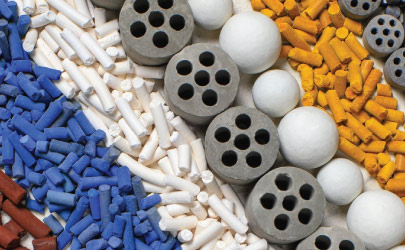Clean Fuels and Modernization: Exploring Lucrative Prospects in Latin America's Catalyst Market

“The Latin American refinery catalyst market is currently undergoing significant changes due to the region's focus on modernizing its refining infrastructure and improving fuel quality. Many Latin American countries are investing in upgrading their refineries to meet stricter environmental regulations and enhance operational efficiency. This shift is generating a strong demand for advanced catalysts that can facilitate the production of cleaner, high-quality fuels and accommodate diverse feedstock qualities. Leading markets such as Brazil and Mexico are spearheading these investments, driven by their large and expanding energy sectors. The region is also witnessing an uptick in the adoption of catalytic technologies that improve yield and reduce emissions. However, market stability can be impacted by challenges such as economic volatility and fluctuating oil prices. Overall, the Latin American refinery catalyst market shows promise for growth, presenting opportunities for companies offering innovative and cost-effective catalytic solutions.”
Latin America Refinery Catalyst market was valued at USD 330 million in 2023 and is projected to reach USD 620 million by 2030, with a compound annual growth rate (CAGR) of 9.2% from 2024 to 2030.
The Latin American refinery catalyst market is full of key opportunities driven by several converging factors. As the region's refining sector evolves, there's a notable push toward modernization and efficiency, significantly expanding the demand for advanced catalytic technologies. One of the primary opportunities lies in the growing need for cleaner fuels. With increasing environmental regulations and a regional commitment to reducing sulfur and other contaminants in fuels, refiners are investing in advanced hydrocracking, hydrotreating, and reforming catalysts. These catalysts help meet stringent emissions standards and improve fuel quality, positioning them as essential components in the market.
Another substantial opportunity is the ongoing refinery upgrades and expansions across Latin America. Countries like Brazil, Mexico, and Argentina are investing in new refining capacities and revamping existing facilities to enhance their processing capabilities. This infrastructure development creates a robust demand for innovative catalysts that can improve processing efficiency, increase yield, and handle a variety of feedstocks. Refiners are looking for catalysts that not only boost performance but also offer cost-effectiveness and longer lifespans, making this a lucrative segment for suppliers.
The shift towards more sustainable refining practices also opens doors for growth. There is increasing interest in catalysts that support the production of biofuels and other renewable energy sources. As Latin American countries explore alternative energy options and aim to reduce their carbon footprint, catalysts that enable the efficient conversion of bio-based feedstocks become highly valuable.
Additionally, the rise in regional investments in research and development (R&D) provides an opportunity for innovation in catalyst technologies. Companies that focus on developing next-generation catalysts with enhanced performance, energy efficiency, and environmental benefits can capture a significant share of the market.
Economic stability and governmental policies are critical in shaping the market landscape. As Latin American economies recover and stabilize, increased investment in refining infrastructure and technology is expected to drive growth. Companies that align their strategies with these trends and offer tailored solutions to meet the specific needs of the region will be well-positioned to capitalize on the burgeoning opportunities in the Latin American refinery catalyst market.
Competitive Landscape
Some of the major companies operating within the Refinery Catalyst market are: Albemarle Corporation, BASF SE, Johnson Matthey Plc, W. R. Grace, Clariant International Ltd., Arkema, Zeolyst International, Chevron Corporation, Exxon Mobil Corporation, Evonik Industries AG, DuPont, Haldor Topsoe A/S.